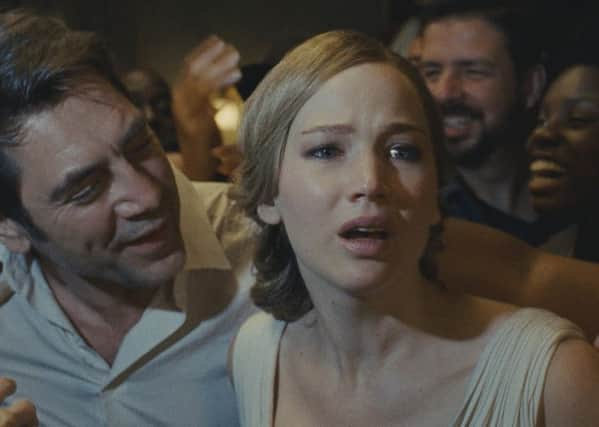Film reviews: Mother! | Victoria and Abdul | The Villainess


Hell is other people in Mother!, Darren Aronofsky’s nightmarish rollercoaster ride through a young woman’s rapidly unravelling psyche as a succession of strangers invade the elaborate home she’s in the process of renovating for her husband. Played by an against-type Jennifer Lawrence, the never-named woman is the devoted wife and muse of an egocentric poet (Javier Bardem) who’s old enough to be her father and casually cruel enough to join the long line of asshole artists who expect the world to fall at their feet. He hasn’t written anything for years – and his lack of output is matched by his unwillingness to put out, something that has left Lawrence’s lonely and frustrated spouse walking on eggshells round the house as he spends an inordinate amount of time in his study fawning over an odd crystal-shaped heirloom.
The crystal is the only artefact to have survived a fire that all but destroyed the house before Lawrence’s character was on the scene. Her devotion to reconstructing the strange octagonal country manse – from which she doesn’t seem able to leave – is broadly metaphorical of the supportive role she’s expected to play in her husband’s professional life. Having let her own insecurities take over in lieu of a healthy relationship with her deceptively charming husband, the house has become her sanctuary, despite its walls turning spongy, its floorboards becoming fleshy and a discarded heart playing havoc with the plumbing.
Advertisement
Hide AdThese are the first proper indications of the surreal, hallucinatory, horror movie dream-logic Aronofsky is following in Mother! and it’s worth embracing early on because things only get stranger and more out-there with each passing minute. This is especially so following the arrival of a bizarre old man (Ed Harris) at their door one night. What transpires is weird and off-putting and leaves Lawrence’s character confused and even more unsettled, something compounded by the way her husband welcomes him into their home, along with his wife, who arrives the next morning and whose pointedly personal remarks towards Lawrence immediately test the limits of her compliance with the forced politeness of marriage and the demands of unexpected hospitality (the wife is played by a fabulously unpleasant Michelle Pfeiffer).
And then things get really weird. As her husband continues to invite chaos into their home for his own artistic gratification, Lawrence is pinballed through scene after scene in which more and more people arrive to trample all over her life, invade her space and casually insult her with their entitled attitudes and behaviour. Her frustration and rage grow increasingly impotent, and after she falls pregnant, the exclamatory melodrama indicated by the title intensifies further.
Though Lawrence is playing a more passive character than normal here, it’s not a passive role: she’s stuck in a dream world over which she has no control and Aronofsky makes sure we’re with her – on her side and in her mind – by shooting everything from her point of view. In some ways it plays like a continuation of both The Wrestler and Black Swan’s explorations of the destructive nature of performance and creation, though in this instance Aronofsky’s sympathy is not with the artist but with people they feed off, rely upon and sometimes discard when their work is done.
But like so many of the good horror films this year, Mother! also feels tethered to the crazy uncertainty of the real world. As structured, it’s impossible to predict what will happen next and, while there’s a kind of escalating madness familiar from Aronofsky’s past films from Pi and Requiem for A Dream right through to his big-budget Old Testament wig-out Noah (there’s a bit of an Old Testament, apocalyptic vibe about Mother! too), its home-invasion premise feels broadly reflective of the way social media has opened up a channel directly into our homes for strangers to be casually hostile. The film’s increasingly wild plot deviation also parallels the way ongoing political uncertainties have made days feel like weeks and weeks like years. This is the sort of film that likes to pull the rug from under you and reveal a gaping void of unimaginable horror. It’s certainly not comfort viewing. Home might be where the heart is, but whether said heart is still beating within a human body is another matter entirely.
Victoria and Abdul is very much comfort viewing – if your idea of comfort is a jocular trawl through the extended cinematic universe of Queen Victoria. Twenty years on from Mrs Brown, Judi Dench reprises her role as the titular monarch in this anachronism-strewn exploration of her relationship with Abdul Karim (Ali Fazal), a handsome young Indian servant with whom she apparently became quite taken in her final years. Though there’s an interesting story here about Britain’s waning Empire and the terrible inequities of the Raj, director Stephen Frears and Billy Elliot screenwriter Lee Hall jettison it in favour of a cosy heritage buddy comedy full of groaning stereotypes, panto villainy and a reimagining of Queen Victoria as some sort of proto liberal progressive. Dench is fine, but the film is a chore and a bore.
The new South Korean action extravaganza The Villainess, meanwhile, is a triumph of style over coherence. Revolving around a female assassin turned government agent who goes on a rampage of revenge when a figure from her past shows up, it’s full of breathless action, but the convoluted plot conceived to tie it all together succeeds only in repeatedly tripping it up.